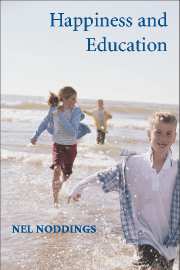11 - Community, Democracy, and Service
Published online by Cambridge University Press: 30 June 2009
Summary
It seems right to say that people get most of their happiness from personal relations, the development of individual talents, and congenial work. What, then, is the contribution of community to happiness? Sociologists have identified periods in Western history characterized by what seems to be alienation and fear that the culture is falling apart. Such periods sometimes follow eras of rugged individualism. In one period, people are eager to escape the bonds of community; in the next, they may fear its loss and try to recapture it. In both, community may affect happiness in ways of which we are barely conscious. Similarly, life in a liberal democracy may support the pursuit of happiness indirectly. However, some people derive happiness directly from community work and participation in democratic organizations.
I'll start the discussion with a brief examination of the human need for community. Next, we'll look at the standard-setting and socialization function of community. It is this function that sometimes drives people away from community. Paradoxically, it is also this function that people dread losing. One person's freedom is another's chaos. We will also consider ways in which some of our happiness may have roots in a democratic form of life. Finally, we will look at the gifts given and received in volunteer work and the role schools might play in introducing students to such activity.
The Need for Community
Community is difficult to define, and perhaps it is better not to do so at the outset.
- Type
- Chapter
- Information
- Happiness and Education , pp. 220 - 239Publisher: Cambridge University PressPrint publication year: 2003



